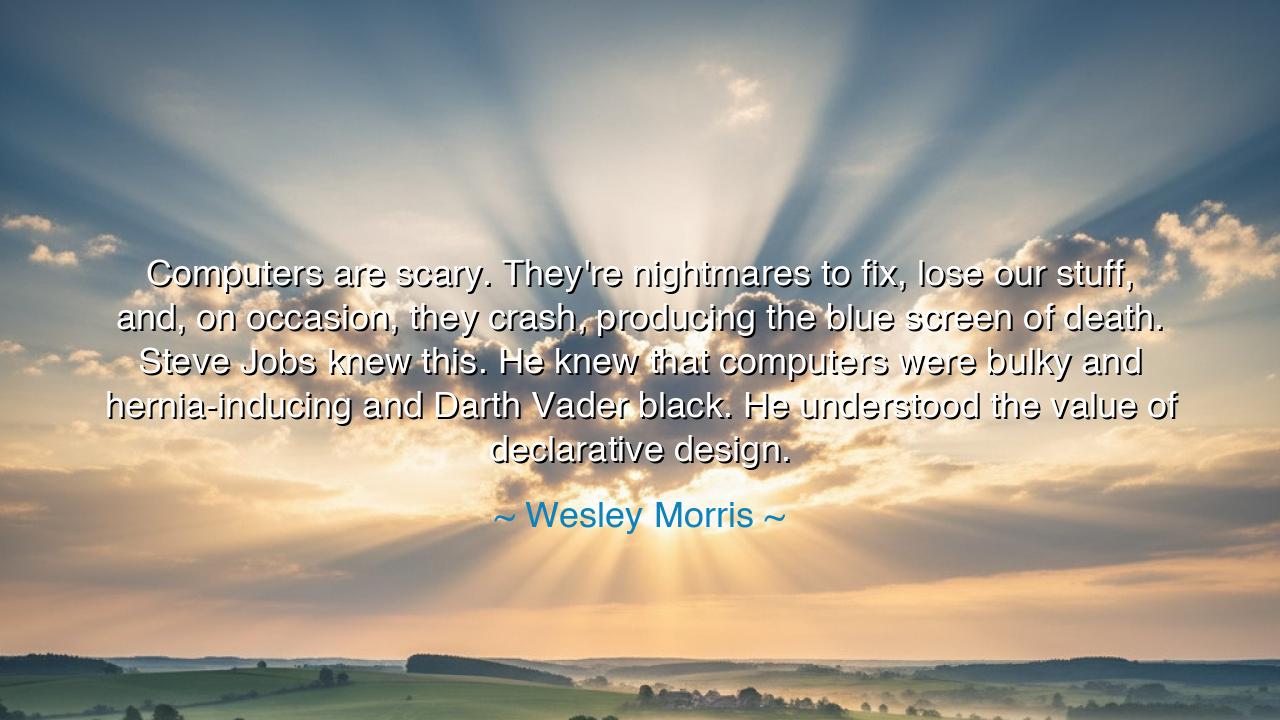
Computers are scary. They're nightmares to fix, lose our stuff
Computers are scary. They're nightmares to fix, lose our stuff, and, on occasion, they crash, producing the blue screen of death. Steve Jobs knew this. He knew that computers were bulky and hernia-inducing and Darth Vader black. He understood the value of declarative design.






Hear now, O Seeker of Truth, the words of the wise Wesley Morris, who speaks of the mysteries and fears that lie hidden within the very tools we use to navigate the world. "Computers are scary," he says, as if to conjure a dark, unseen realm where these mechanical beasts dwell. Indeed, these machines, which we now deem essential to our lives, have long held within them a mystery—a power that can overwhelm the unprepared. They are the nightmares we cannot escape—flickering screens, files lost in the ether, and the dreaded blue screen of death. Morris speaks not just of the technology itself, but of the emotional toll it takes on those who are bound to it.
The fear of the unknown is one of the oldest, most primal fears that humankind has faced. And in this modern age, computers have become the very embodiment of that fear. We fear their unpredictability, their glitches, their fragility. How many have wept as their precious documents or treasured photos are lost forever with the push of a button? How many have cursed when the blue screen of death appears, a cold reminder of our impotence against the machines we have come to depend on? In this way, computers have taken on the role of the monster in the closet, ever ready to devour all that we hold dear.
But Steve Jobs, the wise visionary, understood this fear. He, too, saw the computers for what they were: bulky and hernia-inducing creatures of chaos. He understood that their mystery was not merely technological, but psychological—that to most, they were unapproachable, unfathomable, even alien. And yet, Jobs did not shy away from this fear. Instead, he confronted it with a force that would forever alter the landscape of technology. He understood the value of declarative design, which means making things simple, intuitive, and beautiful—so that even those who feared the very machines could approach them with ease.
Consider, O Seeker, the wisdom of Jobs' creations—the iPhone, the MacBook, and the iPad—machines of such elegance and ease that they no longer inspire terror in the hearts of their users. Jobs took the most intimidating of tools—machines capable of vast, seemingly incomprehensible power—and shaped them into objects of simplicity. He removed the complexity, softened the edges, and turned technology from an oppressive force into a companion that could be understood and controlled. Like the great alchemists of old, who sought to turn base metals into gold, Jobs transformed the terrifying into the familiar, the complex into the clear.
In this, there lies a profound lesson for us all. In every field, whether in technology or in the arts, the greatest of minds understand that simplicity is the key to mastery. It is not the complexity that breeds greatness but the ability to take something complicated and make it accessible to all. In this, Steve Jobs was no different than the great philosophers of the ancient world, who sought to understand the complexities of the universe and distill them into simple, elegant truths. He embodied the principle of clarity, and through this clarity, he showed us the way forward.
Let us now reflect on the practical wisdom that can be gleaned from Jobs' approach. In every part of your life, seek simplicity in your work, in your relationships, and in your endeavors. Where there is confusion, strive to bring order. Where there is complexity, seek the path of clarity. This is not just the way of the artist, the philosopher, or the inventor—it is the way of the wise. It is the path of those who understand that greatness lies not in the accumulation of knowledge, but in the ability to communicate that knowledge with grace, beauty, and understanding.
Finally, let us not forget that even our greatest tools are imperfect. They may crash. They may falter. But through the wisdom of those who shape them, like Steve Jobs, we can find a way to transform the most terrifying and chaotic of forces into something beautiful. The blue screen of death, that harbinger of despair, is no more than a temporary disruption on the path to progress. Technology, like water, will always find its level, and through clear, simple design, we can continue to shape it in ways that benefit us all.
Thus, O Seeker, let us honor the teachings of those who have mastered the art of design, and let us, too, seek to simplify the world around us. In the face of chaos, be it technological or otherwise, find clarity, find simplicity, and in this, you will find your way forward.






AAdministratorAdministrator
Welcome, honored guests. Please leave a comment, we will respond soon